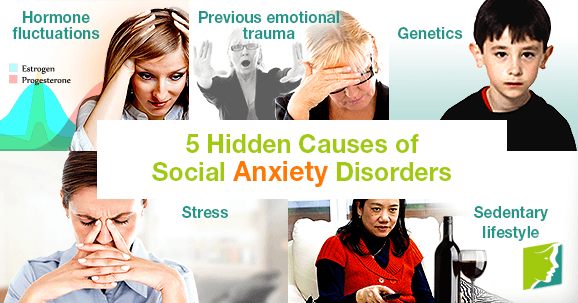Anxiety disorders affect around 40 million Americans on average. Anxiety is defined as a psychological state that is characterized by the intense and constant feelings of worry. Social anxiety disorder is a type of anxiety that is defined as the overwhelming fear of being humiliated and scrutinized in public. Social anxiety disorder can be caused by many things, and typically tends to develop during childhood, often worsening over time. The majority of research on social anxiety disorders focus on the social triggers that lead to anxiety rather than the hidden causes.
Social Anxiety Disorder
Social anxiety disorder, also known as social phobia, is defined by extremely self-conscious feelings in everyday social situations. People with social anxiety have a strong fear of being watched and judged by others. They are painfully shy, get embarrassed easily, and have trouble facing social situations like public speaking, eating meals in front of others, and talking to people, especially strangers.
Common symptoms of social anxiety can be divided into physical and behavioral. Physical symptoms include blushing, sweating, trembling, rapid heartbeat, difficulty speaking, muscle tension, and nausea. Behavioral symptoms consist of negative, debilitating thoughts about oneself and over-analyzing one's own social performance. People with social anxiety disorders typically avoid social situations - like dates, parties, and interactions with strangers.
Hidden Causes
There are many triggers that can lead to social anxiety disorders, and some of them are more common than others.
Hormone fluctuations
This is the leading cause of stress, anxiety, and depression in middle-aged women going through the menopause transition. Estrogen in particular can influence mood regulation.
Previous emotional trauma
If someone experiences a humiliating situation when they were young, it is possible that it will stay with them for years, triggering social anxiety in fear of it happening again.
Genetics
Biological makeup plays a role in your risk of developing certain disorders, including social anxiety. Studies have shown that even babies experience shyness from birth that can carry into childhood and beyond.
Stress
Excessive stress often triggers anxiety disorders. Stress often amplifies social anxiety, creating a vicious cycle.
Lifestyle
Factors like poor diet, inactive lifestyle, and excessive drinking can worsen anxiety symptoms. It is important to maintain a healthy lifestyle in order to counter the symptoms.
Social anxiety can range from mild to severe and interfere with everyday social situations and personal relationships. Causes of social anxiety can include anything from genetics and stress to previous emotional trauma and lifestyle. Social anxiety can develop as early as infancy and worsen over time if left untreated. Several helpful treatment methods include psychotherapy, exercising regularly, eating healthy, and trying sedative herbal remedies , such as kava root, valerian, and passion flower.
Sources
- Goleman, D. (1984). Social Anxiety: New Focus Leads to Insights and Therapy. In: The New York Times. Retrieved September 30, 2014, from http://www.nytimes.com/1984/12/18/science/social-anxiety-new-focus-leads-to-insights-and-therapy.html?pagewanted=1
- National Institute of Mental Health. (n.d.). Anxiety Disorders. Retrieved September 29, 2014, from http://www.nimh.nih.gov/health/publications/anxiety-disorders/index.shtml
- Office on Women's Health. (2012). Anxiety disorders fact sheet. Retrieved September 29, 2014, from http://www.womenshealth.gov/publications/our-publications/fact-sheet/anxiety-disorders.html




